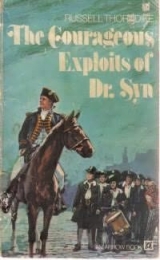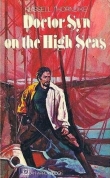
Текст книги "The COURAGEOUS EXPLOITS OF DOCTOR SYN "
Автор книги: Russell Thorndike
Жанр:
Исторические приключения
сообщить о нарушении
Текущая страница: 7 (всего у книги 16 страниц)
6
DOCTOR SYN AT THE ADMIRALTY
Lashed with spray, the tall gaunt figure of the scarecrow stood at the lugger’s helm, as she spanked her way through
the choppy waves of the Channel, with a ninety-mile gale behind her straining every stitch of her crowded canvas.
Behind the hideous mask of the scarecrow’s fearsome disguise, his voice kept croaking out orders. “Strike
nothing. She’s lying low but she rides it bravely. I’ll not lose a whistle of this gale. This change of weather is an
omen for our good. Speed will save our necks. Brace up, my merry lads. Brace up.”
On the other side of the tiller stood Sexton Mipps, masked like his master and answering to the name of
Hellspite. He looked up at his tall companion and shouted above the wind: “Ain’t you better turn in, Scarecrow?
It’s getting dark, and we’ll make Dungeness this night, thanks to them mutineers loading us quicker than they’ve
ever done, through fear of you. You’ve a hard night and day ahead of you. I can manage her now.”
“I know it, Mipps,” replied the Scarecrow. The men were forward, and it was safe to talk without being
overheard. “Tell Curlew to keep the course. I must talk to you in the cabin, for I think we have never been in
greater danger than we are at present, and the next two days will decide our fate.”
As soon as the door of the aft cabin was locked behind them, master and man unmasked, and then Mipps realized
by Doctor Syn’s grave face that he took the situation very seriously.
“Aye, Mipps, the danger is as black as the night ahead of us. The occasion calls for brandy.” Doctor Syn
produced a bottle and two pewter measures, which he filled.
They drank in silence, and then Syn refilled the measures.
“Let us view circumstances calmly,” he said, “and then, having settled our course of action, follow it as swiftly as
this gale, which is so fiercely fighting on our side, against our present enemy, Time. First let us state what we know,
then let us guess what we don’t.”
“Certainly, Vicar,” replied Mipps, holding out his measure for replenishment. “Brandy puts heart into one, and
helps us to remember what we know. What do we know?”
“This,” said Syn decisively, pressing his long forefinger upon a chart of the Channel spread out on the cabin
table. “Somewhere ahead of us is Handgrove speeding for London, in order to betray our organization to the
Admiralty. If he succeeds, our contraband-running vessels will be blockaded in the mouth of the Somme, and it will
be death to our vast brandy trade. This we know, and therefore know that Handgrove must be intercepted. Let us
weigh his chances and ours. He had the start of us last night in an open boat. He has but one sail, and he is
singlehanded. He sailed in calm weather, and not being too skilled a navigator we may take it that he wasted time in
tacking which we would not have done. Remember, he was a farmer, not a fisherman..”
“Perhaps this gale has caught him and him to Davey Jones,” put in Mipps.
“We must not bank on that,” went Doctor Syn. “We must suppose that he is still afloat, and by now the gale that
is driving us is also helping him. But we can make more speed than any vessel in the Channel. Now let us put
ourselves in his place. From what we know of him, let us translate his psychology to ourselves. Here is a desperate
man, who for many weary years has been our prisoner back there in the mouth of the Somme. Under our faithful
French lieutenant, Duloge, he has been worked hard, helping to load our cargoes with no thought of gain to himself.
A little while back a fresh prisoner arrives. He is but one more of many who have betrayed the Scarecrow. This
prisoner, Hart, tells his new companions of the great reward offered for information laid against the Scarecrow’s
organization. Covetous for the freedom and money, he determines to escape, and thinks of the chances he has of
stealing one of Duloge’s fishing boats and crossing the Channel. But he realizes that even could he get away in a
boat, his absence would be discovered at the next roll-call. So he enlists the help of his fellow prisoners: organizes a
mutiny, seizes the store-house on the quay, and with the arms and ammunition contained in it, declare a state of
siege, knowing that there can be no roll-call, and that he can escape without being followed by a larger and faster
boat.
“Of course he had to wait for a favourable night to escape, but he must have congratulated himself that he
effected it before Duloge could get our help. Before leaving he exhorts his fellow mutineers to hold out at all costs
till he brings them rescue from the British Navy. He will hurry, of course, because he is eager for his reward money,
but he cannot know that Duloge and ourselves have acted so quickly, raised the siege, recaptured the mutineers, and
are now on his heels. Still, he will hurry for all that, and having no money will sell the stolen boat and with the
money take to the road.”
“Or keep to the water and sail for the London river,” interrupted Mipps.
“He might, but I think not,” went on Doctor Syn. “He is a landlubber and will feel safer ashore. Therefore, he
will try to land this side of Dungeness, for he would not dare to show his face upon the Marsh, since he has too
many enemies there in the men he tried to betray. I suggest he will make for the Sussex coast, and if successful take
to the Hastings-London road. Hart will have told him that our bitter enemy, Admiral Troubridge, who has offered
the reward against us, is at the Admiralty.”
“It was to Troubridge he betrayed his two friends at Dover, and had we not rescued them from their cells, their
necks would have been stretched. He knows that the irate old Admiral will have his face saved if he can discover
our secret harbour in France, for we have fooled the old sea-dog too much in the past. So, Mipps, we will land and
run our cargo as usual, and them make for the hidden stable. I shall be on my way to London before dawn, and at
least far enough from the locality where Gehenna’s magnificence might be recognized. You will follow by coach,
catching the mail from Ashford. I will carry you as far, and drop you before dawn. Meanwhile our men must search
for news of Handgrove. They must make enquiries as far as Hastings. If his boat has not arrive, then we have time
to prevent Handgrove’s interview with the Admiral.”
“Aye, sir,” replied Mipps, “and that will take him time. Didn’t Captain Blain tell us the other day at the
Vicarage, when he was dining with you, how difficult it was to get things settled quick-like at the Admiralty? We’ll
get time, with luck.”
Before Mipps left his master to take over the watch, they discussed their plans in full detail. Mipps raised two
objections.
“Even to save time, Vicar,” he said, “it’s madness for Doctor Syn to ride Gehenna. The Scarecrow’s horse
should never be associated with you. Gehenna must attract attention. An animal in a thousand. Even by riding on
the secluded road, as you must, someone is sure to notice you.”
Doctor Syn shook his head. “I cannot borro w from the Squire’s stable because I am believed to be in Rye.
Besides, he has nothing so fast or so strong as Gehenna. And certainly if I were to take side lanes and bridle paths, I
should be noticed, as you say. No, I shall drop you at Ashford before dawn and then ride up on the Dover road. It
will be faster going, and the turnpike keepers are well used to fast-mounted messengers riding on the King’s
business between Dover and London. And there is one man I can trust to hide Gehenna in the city. The landlord of
the Mitre Inn will see to him. Is he not one of our biggest receivers? He would only put a rope round the his neck if
he betrayed us. Besides, old Bubukles makes too much profit from us to do any such piece of stupidity. Any by the
way, Mipps, I have always found that the truth is safer than a lie. In case the Squire takes it into his head to ride
over to the Mermaid Inn at Rye to visit me, as he sometimes does, you will leave a letter for him at the Ashford
coaching office for the down mail. I will write it now, telling him that I have to visit the Archbishop at Lambeth.
Fortunately His grace is there, and I shall make the confirmation candidates at Rye my excuse for being in London.
Now help me to finish this bottle and then on deck with you. I know that you can snatch some sleep upon the
coach.”
The bottle finished, Mipps left his master chuckling over his letter to the Squire of Dymchurch.
Now Captain Blain, billeted at the Vicarage as the guest of Doctor Syn, was most anxious to see his host come
back from Rye, since during the night of his departure he had been awakened by the noise of horsemen. Cautiously
peering through the shutters, he had seen the Scarecrow himself, with some half-dozen Nightriders. He had seen
one of them dismount and write with a piece of chalk upon the stable door. Determining if possible to wing the
Scarecrow, he had crossed to his bed to snatch his loaded pistol from under the pillow, but as he returned to open the
shutters and the casement a shot had struck one of the diamond-shaped panes, and by the time he had recovered
from his rage and his surprise, he saw the Phantom Horseman riding away into the Marsh. Groping his way
downstairs, he had found a lantern and had gone out to examine the writing upon the stable door. Signed with the
Crude sketch of a Scarecrow, the chalk message read, “Friday, low, tide.”
He was glad he had crept from the house, because the next morning the chalk message had disappeared. So upon
that Tuesday he told the Bos’n that the men would have no night duty till Friday. Clever as he had proved himself,
Captain Blain never suspected that the message had been written for his benefit, and his alone. Anyway there were
no revenue men out upon the Tuesday night when the lugger ran ashore at Littlestone, was met by the
Highwayman, impersonating the Scarecrow, and all the valuable cargo of good brandy was landed safely and carried
across the Marsh on pack-ponies to the ‘hides’ upon Lympne Hill.
Half an hour after the last keg had been safely stowed, and the pack-ponies had been dispersed to their various
stables, Gehenna the Scarecrow’s famous horse, was being saddled by Jimmie Bone, the Highwayman, in the secret
underground stable, adjacent to Old Mother Handaway’s hovel and farmyard, in the lonely centre of the Marshland.
The Scarecrow changed from his fantastic rage into the elegant black clericals of Doctor Syn. Hellspite similarly
became once more the respectably dressed servant, Mipps, who had helped the Highwayman to attack loaded
holsters and saddle-bags to Gehenna’s harness. Into the deep pockets of guineas, and having given Mipps the letter
which he was to post by the down mail from Ashford for the Squire, declared himself ready for the road. The great
horse was led out of the stable. The door was secured behind them, and the Doctor leapt into the saddle, Mipps
scrambling up behind him.
Bending down from the saddle, Doctor Syn gripped the Highwayman’s hand and whispered: “See that further
hints of a great run reach Captain Blain and the Kings’s men for Friday. But there will be no run of course. It may
take some days to run Handgrove to earth.”
“I hope you may get him, sir, replied Jimmie Bone, “alive or dead.”
“ If he lives we shall get him alive,” said Doctor Syn, “and after see him dead. Our luck will hold good. Within the
last twenty-four hours we have crossed the Channel, put down a dangerous mutiny, unearthed the plot of a rascal,
and run a good cargo of contraband. And now we ride on the track of the rascal, and I doubt not that we shall pull
him down. Good-bye.”
Despite his double load, Gehenna broke immediately into a gallop and thundered away across the Marsh.
It was still night when Mipps slid from Gehenna’s back and bade his master farewell outside the town of
Ashford.
The Doctor Syn rode hard. With his hat pulled well down over his eyes, and a black scarf hiding his chin, no one
would have thought that this magnificently mounted gentleman in the black, well-cut riding coat, was a country
parson. His rapid progress was misunderstood, for at every turnpike he would bend low in the saddle and whisper to
the keeper: “There are French spies abroad. I ride on the King’s business. Should any question you, as to whether I
have passed on this black horse, you will shake your head. You are, I take it, loyal enough to welcome and bury
King George’s secrets with one of his guinea spades? You have not seen me pass, eh?”
The turnpike keepers only wished that such messengers could ride upon the King’s business every day.
Gehenna reached Ely Place before dinner-time, and was safely lodged with mine host of the ‘Mitre.’ Half an
hour later the Vicar of Dymchurch sat in the waiting-room of the Admiralty in Whitehall, having requested an
interview with Admiral Troubridge.
Having the profoundest respect for the brave parson who had from every pulpit of the Romney Marsh, publicly
attacked the crime of smuggling, the old sea-dog did not keep him waiting. In fact, he was delighted to see him.
“We are desolated, my dear Admiral,” said the parson, “that you have left Dover for the Admiralty. I fear that
your successor will not be interested enough to back me up against these smugglers that give our Marsh villages so
bad a name. Had you remained in our vicinity, I think that between us we might have got the better of them. But I
fear I tire you. You have now greater responsibilities, and cannot be interested, even in our notorious Scarecrow.”
“On the contrary, Reverend Sir,” beamed the Admiral, “I always asked you for information when I was at Dover,
and I take it you have called upon me now to give me some. I shall welcome it and you, for I am still resolved to
catch this Scarecrow of the Marsh.”
“I fear, sir,” replied Doctor Syn, “that my purpose in London is to call upon His Grace of Canterbury at Lambeth.
I shall have to repot to His Grace that since your leaving us the Scarecrow has been more daring than ever. I fear
now that he will never be taken.”
“You think so, eh?” chuckled the admiral. “You think also that I have abandoned you? No. Doctor Syn. I am
expecting a visitor this very day who can give me information which will enable me to smash the Scarecrow’s
organization at the very source. I am to learn full details of his secret harbour in France. I shall be able to bottle up
his ships before they enter British waters. Then what can he do?”
“That would indeed be a master-stroke, sir,” was the Doctor’s enthusiastic reply. “By the way, sir, I am
expecting one of the Archbishop’s servants to wait upon me here within the next quarter-hour. May I have you
permission to wait for him in your enquiryroom?”
“Certainly, Doctor,” said the Admiral. “You may come and go as you please. I will give orders for you. In the
meantime read that.” He threw a note across the table. Doctor Syn picked it up and read:
You may remember my name. I betrayed two of the Scarecrow’s men to you, Admiral Troubridge, eleven years
ago. You think I am dead. No sir, I have lived a living death as a prisoner of the Scarecrow. He was too clever for
me and for you, sir, and the Navy. But now I can get my revenge and give you yours. I have escaped from his base
in France. I can show you, just as soon as you have paid me the reward for such, the very spot in France he loads
his ships with French contraband. When you pay me in golden guineas I will take you to the spot. A condition is a
free pardon to certain Romney Marsh smugglers who fell foul of the scarecrow. They are not dead, as supposed.
They are prisoners with their wives and children. It has been their lot and mine to load the contraband fleet. For
my information, I demand the reward and a rescue for my unfortunate colleagues. Your honor may remember my
name.
Your Servant,
One Handgrove.
“This should prove most valuable,” exclaimed Doctor Syn. “Through it I have no doubt but that you will take the
Scarecrow himself. May I wait upon you later in the day?”
“We will sup together,” said the Admiral. “By that time I may have something to tell you. Shall we say the Ship
Tavern in Whitehall? At nine o’clock this night?”
“I shall be delighted,” agreed Doctor Syn. “But if you will excuse me now, I will go and await the servant from
Lambeth Palace. You expect this Handgrove today?’
“Aye, and he’ll be here, too,” explained the Admiral, “because a verbal message was given to me by his
messenger who brought this note. He asked for an early appointment, and by the clock he should be in the enquiryroom within the next ten minutes. Do you remember Handgrove? Eleven years ago he was one of your flock.”
“One of its blackest sheep, I fear, Admiral,” replied the Vicar. “I recollect him well, though I doubt whether he
would know me. He was not given to attending church.”
“Why not stay and hear what he has got to tell me,” suggested the Admiral.
Doctor Syn shook his head. “My presence would embarrass him. Besides I am awaiting the messenger from
Lambeth, who is to tell me where I am to meet the Archbishop.”
“Then I will not detain you,” said the Admiral, ringing a bell, which was promptly answered by a petty officer.
“Conduct Doctor Syn to the enquiry room,” he ordered. “He is expecting a messenger.” The Admiral shook
hands with his guest a nd added, “Nine o’clock, then, Parson, at the ‘Ship’ in Whitehall.”
Doctor Syn found the enquiryroom a lively place. Groups of officers awaiting appointments with their Sea
Lords, were renewing old acquaintances, and exchanging gossip of His Majesty’s ships. Taking the elegant parson
for a chaplain of the fleet they bowed politely as he made his way to the window overlooking the front courtyard.
He knew that Handgrove must come in that way and be directed by the sailor on guard to the enquiry -room.
Although Handgrove had not set eyes on the Vicar of Dymchurch for eleven years Doctor Syn had seen him
many times, and recently from behind the Scarecrow’s mask when the smuggling business had taken him to France.
He would have no difficulty in recognizing him. Neither did he, for after three minutes’ vigil at the window, he saw
his man creeping through the archway. Turing abruptly from the window Doctor Syn walked briskly to the door,
and asked the petty officer acting as usher to order him a hackney coach. As he crossed the courtyard the
approaching Handgrove saw the petty officer salute the parson and dash away. As he mounted the steps of the main
entrance that led to the enquiryroom, the parson came down the steps to meet him.
“Your name is Handgrove, I believe,” said he in a quiet, pleasant voice. “You are here by appointment to lay
information before Admiral Troubridge concerning a certain party whom it is safer not to name. You may wonder
how I knew you, but before I was made Chapla in to the Admiralty here I was Vicar of Dymchurch. You
disappeared from my parish some eleven years ago, and were given out as dead. I am delighted to find you alive.”
“I am here to see the Admiral,” growled Handgrove sullenly.
“Who has appointed me to take you to him,” replied the parson. ‘It will be my duty to take your Bible oath upon
the truth of what you tell us. I shall then hand you this bag of guineas in advance of your reward, to show you our
good faith. The rest will be paid when we have proved your statement true.” Doctor Syn drew a money-bag from
his pocket, and Handgrove heard the chink of gold. “A hundred guineas, Handgrove, which you shall count after
taking your oath. You will then be detained under the protection of the Admiralty till your story is proved.”
“It’s true enough as a certain party will find to his cost,” snarled Handgrove. “I shall be glad when it’s over, and
hope the authorities won’t delay. Where’s this Admiral?”
“I am waiting for a coach to take us to him,” replied Doctor Syn. “It may interest you to know that a certain
party has sent him a threatening letter stating that if you enter the Admiralty you will be killed before you can utter a
word. The Admiral, knowing as I do from bitter experience, that this unnamed one never utters idle threats, has
commissioned me to take you to his private lodgings, and I think here is our conveyance.”
Handgrove saw a coach with a sailor on the box seat beside the driver enter the yard. The petty officer sprang
down and opened the door. Doctor Syn stepped in and told Handgrove to sit opposite him. He then called out,
“Lambeth Palace.”
“Lambeth Palace,” repeated the saluting petty officer, and the coach rolled out of the yard.
“Why there?” asked Handgrove.
Doctor Syn smiled. “Because it is not where we are going, and when we are clear of Whitehall I shall change
direction. We do not want to give information to the scarecrow’s spies, and no doubt there are many now about the
Admiralty, waiting for you.”
“But how could he know that I’ve escaped? Asked Handgrove.
“My good fellow, don’t ask me,” replied Doctor Syn. “I begin to think, as many do, that there is something
supernatural about him. I have striven against him in the past, just as the Admiral has, and if now you have it in
your power to overthrow this devil, the government will owe you much, and you will deserve the large reward.”
According to his changed direction the coachman at length pulled up his horses opposite the alleyway that led to
the secluded Mitre Inn. Paying the coachman, Doctor Syn ordered Handgrove to follow him, and led the way to an
upstairs sitting-room, where Handgrove saw a spread dining-table laid for three.
“The Admiral though it best for us to dine together here in private,” explained Syn.
“I have no wish to dine with gentlemen,” growled Handgrove.
“You will change your song when mine host brings in our covers,” laughed the Doctor. “Now while we wait for
the Admiral we will count these guineas.” He drew a Bible and the bag of guineas from his pocket. “Here is the
good Book ready for your oath, and here the guineas.” He laid the Bible on the table, and then poured out the
money on to the white cloth. “I have counted them at the Admiralty, but had better satisfy yourself. I will go and
see if the Admiral is in the common-room below.”
Closing the door behind him Doctor Syn beckoned to the waiting host of the ‘Mitre.’ You are sure you can do
it?” whispered the Doctor. “Remember I want him alive. You must strike carefully.”
Mine host nodded. “I have a heavy, lead-loaded, brass candlestick upon the sideboard behind his chair. I’ll not
kill him.”
“I took him from under their noses without suspicion,” chuckled Syn. “And good for us all that I did. If he had
reached the Admiral you and I and some hundred others would have had our necks stretched. The cellar is ready?
And the cellarmen?”
“Trust me, sir,” whispered the landlord.
“Then bring up the tree covers as soon as you will,” said Syn, “for if I have to look at that traitorous dog much
longer it will spoil my appetite. Mipps will be here by coach tonight, when we can shift the rogue from your celler
aboard the lugger in London Pool. Drunk sailors are a common enough sight upon the quays. We shall have no
trouble. But once again let me remind you not to kill. I wish him to take his last voyage alive.”
Doctor Syn re -entered his private sitting-room briskly. “The Admiral will join us in a moment, Handgrove. He
has ordered dinner and begs us to start. You will sit there. Myself opposite, and the Admiral here, Is the money
correct?”
“Aye. Ten piles of ten as you see,” replied Handgrove.
“And here is mine host with the covers. Master Bubukle, the Admiral has ordered us to start. I will ask a
blessing. ‘May we who eat this food be faithful unto Thee, loyal to the King, and steadfast to our fellows. Amen.’
Now, Handgrove, fall to with good appetite.”
Mine host lifted the cover in front of Doctor Syn, as he saw the steam mount up into Handgrove’s face. Then a
sickening thud, and Handgroves’s head was on the table.
“Took it beautiful,” chuckled the landlord. “Now a boozer’s hoist to the dellars, and my cellarmen will look to
him.”
Five minutes later Doctor Syn and mine host were doing full justice to the sucking-pig.
During that afternoon the Vicar of Dymchurch visited Lambeth Palace and took a dish of tea with the
Archbishop.
At five minutes to nine the same Vicar was awaiting the arrival of Admiral Troubridge at the Ship Inn of
Whitehall.
During those five minutes, for the Admiral was punctual at nine, Doctor Syn found occasion to leave a sealed
letter addressed to the Admiral on the hall table reserved for patron’s messages. That the Admiral was in a rage was
apparent, but it was not till the waiter had left them to their soup that he explained.
“The rascal never turned up, Doctor Syn. Do you know, I think the Scarecrow’s got him.”
The Parson lo oked incredulous. “Come, come, Admiral. That is surely impossible.”
The waiter brought the fish, and laid a letter by the Admiral’s plate. As he read the contents the old sea-dog
nearly had apoplexy. “It’s true,” he gasped. “I’m right! Read, read.”
Doctor Syn adjusted his spectacles and read quietly: “Handgrove cannot attempt to betray me again. Let his
fate be a warning to you and that meddlesome Parson of Dymchurch. I will not brook your interference.”
It was signed by a rough sketch of a scarecrow.
Later that night, at the Mitre Inn, the Vicar of Dymchurch whispered to Mipps: “We shall have no more mutinies
amongst our prisoners in France. I have a means of making Handgrove see to that. You will enjoy our next
adventure, little Mipps, I promise you.”








